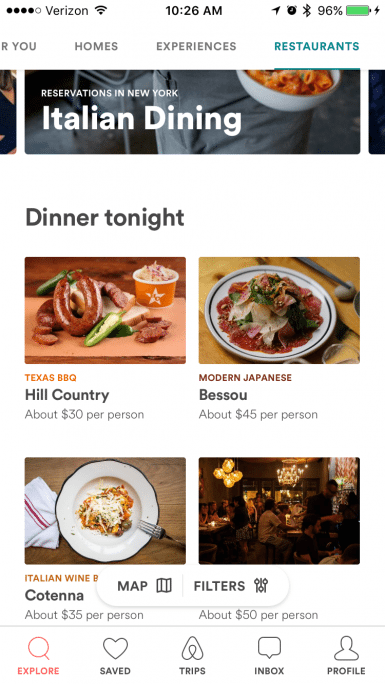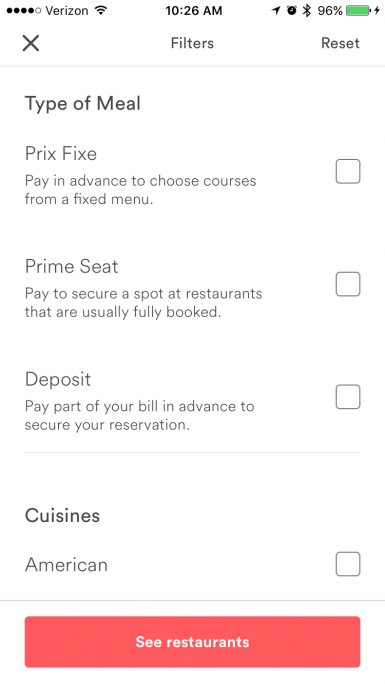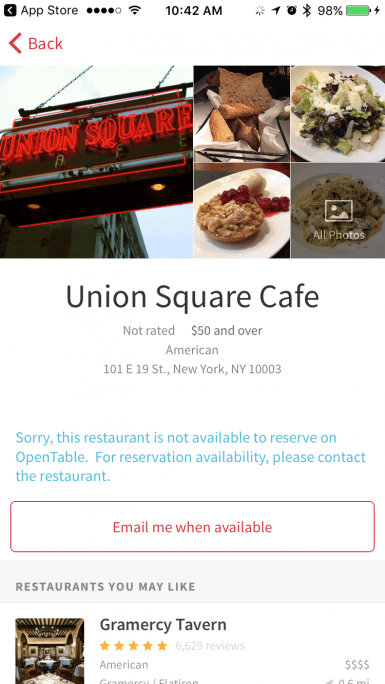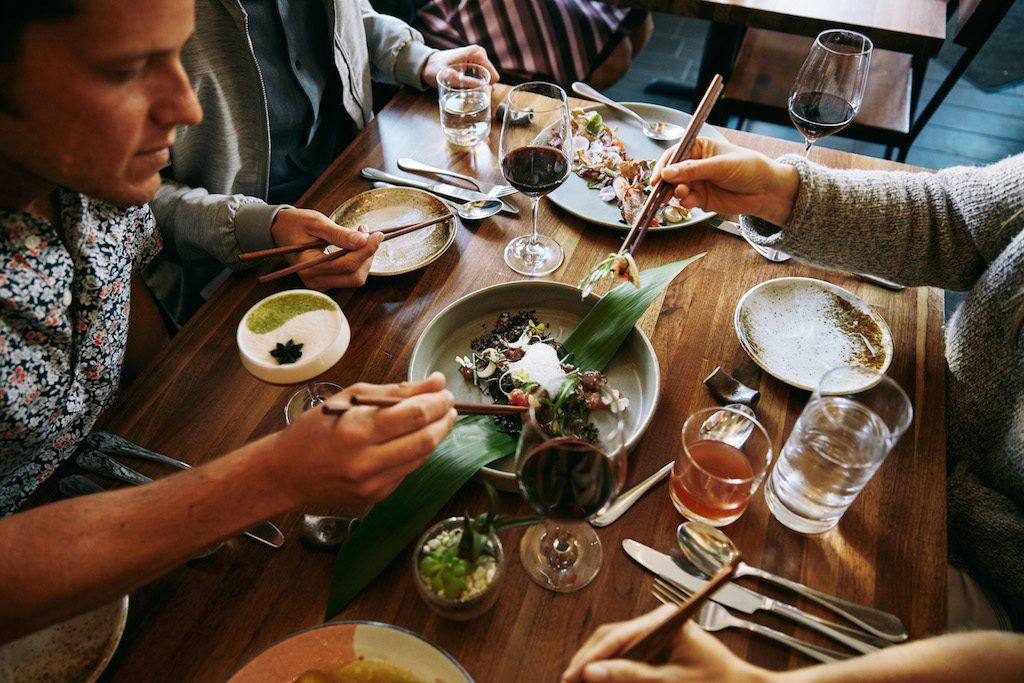Skift Take
Can Resy do more than just restaurant bookings for Airbnb? Our answer is a resounding yes.
When Airbnb announced it led a $13 million Series A investment in New York City-based dining reservations platform Resy in January, it was readily assumed that we’d see some sort of synergy between the two companies — aside from the fact that Airbnb CEO Brian Chesky’s sister, Allison Chesky, also happens to be the managing editor of Resy.
And on Wednesday, we did, when Airbnb announced an expansion of an earlier pilot program it ran in May, allowing Airbnb app users to book restaurant reservations, powered by Resy (see video below for an explanation of how it works).
There are many reasons why this integration of Resy into the Airbnb platform makes sense. This is especially the case when you consider Airbnb’s pursuit of becoming a “super brand of travel” and owning more of the overall traveler journey or experience, whether by adding tours and activities (Airbnb Trips) or even launching something related to flights, as Chesky has previously mentioned.
Giving Airbnb users the ability to book restaurant reservations via Airbnb/Resy makes those users’ in-destination experiences that much richer, and makes them feel that much more connected to Airbnb’s tagline of helping travelers “live there” like a local. And no doubt it echoes the “breakfast” in the company’s original name inspiration of “Airbed and breakfast.”
But what else can, or should, Airbnb be doing with Resy to make those goals — to become a super brand of travel and to help people “live there”— even more of a reality?
About Resy & the Competitive World of Restaurant Software Companies
For those wondering what Resy is, it’s a restaurant software company akin to Priceline’s OpenTable. Restaurants pay Resy to power their reservations and, in some cases, handle marketing and website design. It was founded in New York City in 2014 by Eater co-founder Ben Leventhal, CrowdTwist co-founder and former CTO Michael Montero, and social media expert and entrepreneur Gary Vaynerchuk.
Leventhal, speaking at a media event announcing the Airbnb integration, said: “We’re still a young company. This is an opportunity to partner with Airbnb and accelerate our growth.”
But unlike OpenTable, which has dominated the restaurant reservations space for nearly 20 years, Resy and its peers, which include Reserve and Tock, have a slightly different business model. Where OpenTable charges its restaurant customers a flat monthly fee and anywhere from 25 cents to $1 per diner, per reservation, Resy and others like it charge their restaurant customers a flat monthly fee.
“The prospect of these platforms is two-pronged for a restaurant,” said Simon Yi, a former growth marketing lead at Reserve who now works as a marketing consultant. “Restaurants are being gouged by OpenTable. The promise of OpenTable is that they have a network of diners that new or struggling restaurants can tap into to make bookings and facilitate discovery, and get people to walk through the door. But in reality, what OpenTable has done, to date, is essentially play arbitrage on Google AdWords: advertising against a restaurant’s own brand name and having restaurants pay a markup on what OpenTable pays on a cost-to-click basis.”
According to Yi, these fees “created a big opening for Resy and Reserve and other startups in this space that are undercutting OpenTable by charging a flat fee instead of a per-diner fee. It’s great for the restaurants as far as saving money goes.”
Prior to Airbnb’s announcement of its investment in Resy in January, Resy was already generating buzz of its own, attracting highly acclaimed restaurants like New York’s Le Bernardin and Augustine to its platform.
In December, the well-known restaurateur Danny Meyer of Shake Shack fame, who also happens to be a longtime board member of OpenTable, announced he would use Resy at his reopened Union Square Café. There, managers would pilot a new program, ResyOS, whereby their Apple Watches would be synced to Resy, helping them manage reservations and acting as a sort of customer relationship management system or loyalty program keeping track of diners’ preferences and dining habits. That Apple Watch syncing feature is now available for any restaurant to purchase as part of their package with Resy.
Resy also has an automated waiting list function that alerts users when a table opens up at a hard-to-book restaurant, and it enables diners to communicate directly with restaurants by texting them within the app. The Resy integration with Airbnb also allows for text communication between diners and restaurants, and Leventhal said the automated wait list function would be expanded into Airbnb, too.
Resy, in comparison to OpenTable, still has room to grow. While Resy currently handles reservations for 1,000 restaurants in 80 markets throughout the U.S., OpenTable is truly global, with 43,000 restaurants around the world. The initial Resy integration with Airbnb is limited to 650 restaurants in 16 U.S. markets.
Leventhal noted that by the fourth quarter of this year, Resy will expand globally, but wouldn’t divulge which cities would be first. Airbnb said the restaurant reservations feature will eventually be available in all the languages the company currently has on its site and app as well, making it easy for travelers to make a booking in foreign destinations where they may not speak the language.
OpenTable also has a loyalty program for consumers, and provides its own services for restaurateurs that go beyond simply managing reservations. They include a real-time look at reservations via its platform and the Apple Watch similar to Resy’s ResyOS system. That ResyOS system is still being used by Meyer at Union Square Café as well as other restaurants.

Restaurant reservations on the Airbnb app list estimated dining costs per person. Source: Skift/Deanna Ting
Don’t Just Make It About Restaurant Bookings, But Make the Booking Experience Better
While this initial Resy integration is a good start for Airbnb — and for Resy, which will no doubt benefit from the tremendous brand awareness and user base that Airbnb has accumulated — both companies can learn from what companies like OpenTable have done before but, like true disruptors, work to improve on the experience.
The Airbnb and Resy partnership isn’t the first time a travel company has teamed up with a restaurant reservations platform. Priceline purchased OpenTable in 2014 for $2.6 billion. Also in 2014, TripAdvisor bought French reservations site Lafourchette, followed by other similar sites. However, both Priceline and TripAdvisor have yet to integrate these acquisitions into their main businesses as Airbnb and Resy have done today.

Airbnb users can apply filters to sort through the restaurant listings it has on its app. Source: Skift/Deanna Ting
While it might be easy to assume that the reservations process on the Airbnb app or site would exactly mirror the experience diners already have using Resy, that’s actually not the case here. In fact, the way in which Airbnb has integrated the reservations into its app is more user-friendly, more descriptive, and more editorially driven than what you find on Resy today. Airbnb has developed mini guides for groups of similar restaurants, such as “Iconic Restaurants,” and for almost all restaurant listings, an estimated average price per person is also included. Filters include the ability to pick a prix fixe, pay ahead to secure a “prime seat” at hard-to-book spots, or even pay part of the bill ahead of time to snag a table.
The Resy app, by itself, can be harder to use at times. When users open it, they are immediately given nearby options based on their location, and they can choose between lunch or dinner, but the list of available restaurants is very long and hard to filter or sort through. So if you wanted to specifically eat Italian food, for instance, you’d have to keep scrolling down until you find a restaurant that fits that particular cuisine type. With the Airbnb app, you can more easily filter by cuisine type.
One function that the Airbnb app doesn’t have when it comes to making restaurant reservations, however, is the ability to search for a particular restaurant by name. If a food-minded traveler knows for certain that she wants to dine at a particular place, it’s probably easier for her to simply search for the restaurant’s website and book through that channel instead. On Resy, a search function is available in the app, but it’s not the most intuitive to discover.

Even though Union Square Cafe doesn’t use OpenTable for its reservations, a diner could still find information about the restaurant on the OpenTable app and site. Source: Skift/Deanna Ting
Another thing to note here is that Resy still has far fewer restaurant partners than OpenTable. And one benefit of using OpenTable is that its site and app still list information for restaurants that aren’t using OpenTable for their reservations. Resy, on the other hand, does not list any information about restaurants that are not within its network. Just knowing there’s information available for those restaurants on OpenTable can be helpful for travelers who have a particular restaurant on their dining agenda.
With this point, Resy and Airnb might argue that they’re only showing users the restaurants that matter most, and that they are more “curated” than OpenTable. Regardless, it’s clear that both companies need to continue to improve upon the restaurant booking process for consumers, and make everything as “easy and magical” as Chesky has described.
Tie This Into a Proper Loyalty Program
When Chesky asked people, via Twitter, for their suggestions on what Airbnb should launch next back in December 2016, the “most popular request” was for a proper loyalty program.
OpenTable has its own loyalty program where diners earn points that can be redeemed for dining rewards or Amazon gift cards. However, its program isn’t synced to any of The Priceline Group’s other brands or loyalty programs, which include Booking.com, Priceline, Kayak, and Agoda.
“I could imagine Airbnb taking a page out of OpenTable and the online travel agencies like this,” said Yi.
Joe Zadeh, vice president of Airbnb Trips, when asked if Airbnb was working on its own loyalty program, said there were “no specifics to date.”
Resy co-founder Leventhal said a formal loyalty program for Resy alone “isn’t something we have on our short-term road map” but he added, “it is interesting to us” although the company is currently more focused on generating “loyalty between restaurants and their customers.” He said: “We’re building technology that lets restaurants build loyalty with guests” through things such as “special reservations for their most loyal guests, or specifically for certain neighborhood groups.”
But let’s say Airbnb did finally launch its own loyalty program. If it did, it could theoretically give consumers the ability to earn points, rewards, and special experiences for staying in Airbnb homes, dining in restaurants that use Resy, and booking Airbnb Trips — encompassing accommodations, dining, and tours and activities.
Should Airbnb add flights to its ecosystem, that would bring the company on par with the major online travel agencies, Priceline and Expedia, in terms of its product and loyalty offerings. And with the addition of dining, it would make Airbnb’s loyalty program all the more comprehensive of the overall customer journey, whether that customer was traveling or not.
“It’s just one more step of expanding into all parts of travel,” Zadeh told Skift.
Zadeh said that while Airbnb is primarily focused on providing services for travelers first and foremost, the marketing of the new reservations feature “depends on the market.” “The focus is on the traveler, but I assume we’ll see locals book restaurants as well….It’s a value proposition we can offer to restaurants, too.”
Another option for Airbnb and Resy in terms of loyalty might be to start on a smaller scale, as Airbnb has already done with other travel partners that include Qantas, Virgin America, and Delta Air Lines. It’s not unlikely that, should both companies decide to delve into loyalty, they’ll find a way to cross-promote one another and engender loyalty among their shared customer base.
Another example of a loyalty partnership between Airbnb and Resy could also be modeled after what Uber is doing with Visa in select markets: Visa cardholders who’ve opted into the Visa Local Offers program receive Uber credits, simply for paying at selected businesses with their linked Visa credit card. In this way, diners who eat at restaurants partnered with Resy could receive Airbnb credits, for example.
Yelp, which also lets you book reservations on its app is also doing something similar with credit card partners as part of a “Cash Back” program.
Whatever Airbnb and Resy ultimately decide to do regarding loyalty, it’s clear there are advantages for both companies in working together.
Mine All of the Data
Another key feature of the Airbnb partnership with Resy relates to data. Both companies are rich in customer data and the ability for both to share that crucial information with each other will be essential going forward.
Both Zadeh and Leventhal hinted at just a few of the possibilities their platforms’ shared data could foster.
One example: If an Airbnb user has a trip booked to New York City, Resy and Airbnb can market restaurant reservations specifically to that user within the Airbnb app. A message like “You have 20 days to get your table here” might appear, Leventhal said.
There are also opportunities for restaurants to offer exclusive tables, just for Airbnb users, or special meetups where Airbnb travelers could gather over a meal at communal tables, similar to what a company such as VizEat does.
“This will help us integrate significantly deeper with local businesses and restaurants,” Zadeh said. “We’re already working on personalization, such as delivering personalized recommendations ahead of your trip.”
The new Restaurants tab in the Airbnb app lets users search for tables at restaurants using a variety of criteria, including cuisine type. An Airbnb representative said that as a user books more reservations on the Airbnb app, Airbnb will better be able to make restaurant and dining recommendations to that traveler before they even arrive at their destination.
The “localized” features of the Airbnb app will also give both companies an advantage — the ability to track where their respective users are staying and eating.
Sell to Restaurants
The initial 650 restaurants included in this integration are already benefiting from increased exposure to a larger dining base.
“All of those restaurants and restaurant reservation platforms are doing everything possible to up the SEO (search engine optimization) game,” Yi said. “They want to outrank each other. Instead of fighting for that precious real estate on SEO, Airbnb can provide a new source of traffic for Resy and its restaurant partners.”
But if Airbnb really wants to capitalize on its new partnership with Resy, it should also look for ways to sell additional services or information, like customer data, to those restaurants and their chefs. And, as Zadeh noted, if you think about it, we all probably spend as much — if not more — on where we eat than where we stay on a trip. “It is the bottom of Maslow’s hierarchy of needs, after all,” he said.
Yi, for one, doesn’t think it’s implausible for restaurants to advertise themselves at Airbnb listings. “Ultimately, Airbnb and all of these online travel agencies are in the business of discovery,” he said. “Airbnb could potentially open it up for restaurant groups to begin to advertise at these apartments. I could imagine Resy, at some point, will begin to offer advertising bundles much like OpenTable does with its rewards program — to incentivize diners to book during shoulder periods, for example.”
Skift asked Leventhal if global hospitality packages where travelers might book lodging, dining, and experiences all together might be on the way.
“You’d want to talk to Airbnb about that,” he said, adding that this partnership was just the beginning of “inserting restaurants into the Airbnb ecosystem” and offering “curated experiences.” Perhaps we can expect to see more exclusive chef cooking classes or experiences on Airbnb, too.
Market to Everyone, Not Just Travelers
Another example Airbnb may look to in terms of ways to bring restaurants and other local businesses more into their ecosystem is AccorHotels’ Accor Local pilot program. In this pilot, AccorHotels had its hotel general managers develop relationships with local service providers — restaurants, dry cleaners, florists, bakers, etc. — and make it easier for locals to have access to those services.
An example of the types of local services to be provided by AccorHotels included the following scenario, as described by CEO Sebastien Bazin: “[Maybe] the dry cleaner has someone’s dress or suit, but he has to close his shop at 7 p.m. Why doesn’t he drop the dress off at the hotel next door, and send a text to the customer and say it’s waiting at the front desk? It’s so easy. That’s what Accor Local is all about.”
While AccorHotels is relying on its physical spaces — its hotels — to serve as an anchor to provide local services to residents and travelers alike, Airbnb can rely on partnerships and its network to do the same, in some ways.
Similarly, Airbnb can and should use the addition of restaurant reservations and Airbnb Trips to expand its overall value proposition to its users — whether or not they’re currently traveling. This also has an obvious tie-in to the establishment of a formal loyalty program so dedicated Airbnb users can be rewarded for their loyalty, even when they use local services or go out to eat.
Already, Airbnb has noted that a small but significant number of people booking its Airbnb Trips experiences are locals. Marketing restaurants to users — whether they are traveling or not — simply makes good business sense for Airbnb, Resy, and restaurants. The goal would be for consumers to turn to Airbnb as the one app they’d go to for whatever local services they need, dining included.
Representatives for Airbnb said that for the initial launch of reservations on Airbnb, users of both Airbnb and Resy will soon receive marketed emails promoting the new feature.
Add Recommendations
Given Airbnb’s launch of Guidebooks last year and its famous ratings review system between hosts and guests, it wouldn’t be farfetched to think that the company may consider adding restaurant recommendations to its platform, somewhat similar to how Yelp and Foursquare do.
Yelp, which already has thousands of reviews and restaurant listings, also enables reservations and even restaurant delivery via Eat24, which was purchased recently by GrubHub. It also has a cash back program that its users can opt into.
With Guidebooks, Airbnb hosts and other experts and personalities put together curated lists of suggested things to do, see, and eat in certain destinations. Now that Airbnb users can actually book tables at some of the restaurants suggested in Guidebooks, it’d also make a lot of sense for Airbnb and Resy to add reviews and recommendations to those restaurants as well — or to add an easy way to book a table at a recommended venue from one of its existing lists.
Whether Airbnb and Resy want to open up the recommendations to the general public like Yelp and Foursquare do, or keep them within their community of hosts or users, giving them more control over curation, having that added layer of information helps consumers even more in terms of making decisions on where to eat.
And it’ll help consumers avoid what Zadeh referred to as “menu FOMO [fear of missing out],” especially as more people are increasingly focused on dining not only as a necessity, but as more of an experience, or even entertainment.
“When you go out to eat, it’s not even about filling your hunger,” said Yi. “It’s about an experience. At Reserve, when I was drumming up partnerships there, a lot of conversations were about how dining out is one of the last forms of entertainment. This lends itself easily to Airbnb’s mission of acting like a local and experiencing new things.”
Learn from TripAdvisor, Foursquare, Yelp, and OpenTable — and Evolve
Whatever Airbnb and Resy ultimately decide to do with their partnership, it’s clear that there’s so much more than just restaurant reservations that can be involved. Already, the integration of Resy onto the Airbnb platform, while initially very small, is a major step that its competitors such as Priceline/OpenTable and TripAdvisor/Lafourchette have yet to do.
They are working on it, however. “We continue to test with placements within confirmation emails, and the ability to target diners based on whether they book on priceline.com,” OpenTable SVP of marketing, Scott Jampol, told Chefs+Tech. “Priceline has millions of people sleeping in hotel beds every night, and all of them have to eat.”
But if Airbnb and Resy can expand beyond this initial integration to include restaurant recommendations, exclusive dining experiences, the foundation of a loyalty program, and much more, that will give both companies an edge over the competition, and bring Airbnb even closer to its goal of becoming that super brand — not just of travel, but experiences — wherever the customer may be.
Skift Editor’s Note: For a comprehensive look at where Airbnb is right now, and where the $31-billion company is headed, check out “Airbnb’s Road to an IPO: Everything You Could Possibly Need to Know.”
Dwell Newsletter
Get breaking news, analysis and data from the week’s most important stories about short-term rentals, vacation rentals, housing, and real estate.
Have a confidential tip for Skift? Get in touch
Tags: airbnb, opentable, resy, skift table
Photo credit: Airbnb app and site users can now book restaurant reservations at restaurants throughout the U.S., including Aina in San Francisco (pictured here). Airbnb
